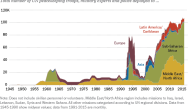
American trade issues aren’t just about China
Americans have good reason to worry about competition from China, the country with which the U.S. has its largest merchandise trade deficit. But competition from high-value exporters such as Germany also poses a challenge that, so far, has been largely ignored on the campaign trail.







